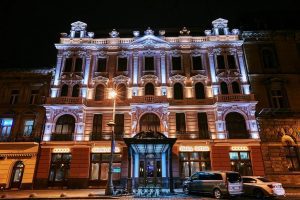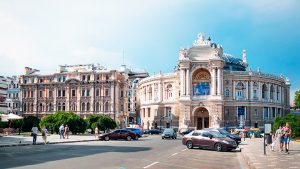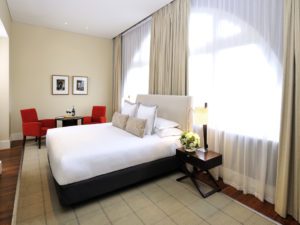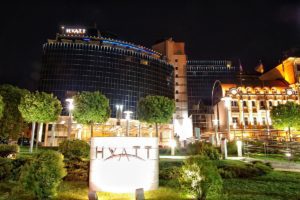
Two thirds of hotels have reduced their expenses by headcount optimization, 27% of respondents have implemented alternative services and rented rooms as offices, according to the study entitled “Ukraine Hotel Market & COVID-19 Impact” conducted by the Ukrainian Hotel & Resort Association (UHRA) together with international tourism experts from Horwath HTL.
“Two-thirds of hotels have decided to reduce prices – an instinctive (yet not necessarily efficient) step to boost occupancy. One third of respondents introduced digital & marketing tools. Apparently, before the pandemic was not considered critical. Some 27% of respondents have introduced alternative services, i.e., co-working, renting rooms as offices, etc,” UHRA International Relations Director Ivan Lun told Interfax-Ukraine.
He added that some respondents (7%) decided to change the function of some areas, i.e. for a gambling facility.
Lun said that vast majority of respondents (93%) confirmed an overall drop in their revenues, and more than 60% of hotels had revenues shrink by more than 40%.
“Only 4% of hotels showed an increase in revenues, and 3% reported that it remained at the level of 2019. Hoteliers who reported growing revenues were all located in the countryside,” the expert said.
Despite a difficult year for the industry, only 2% reported that they are actively seeking exit by selling their hotels and over 90% responded that they will keep operating even with certain limitations.
According to Lun, almost a quarter of hoteliers (23%) expect their performance to return to 2019 levels in 2021; 57% – in 2022 and only slightly less than 20% – in 2023 or later.
Some 122 respondents have participated in the survey, with an average size of 72 rooms per property. Two thirds of the responses came from urban, while 34% from rural locations.

The occupancy of hotels in Lviv in January 2021 was 35%, 31% Kharkiv, 23% in Kyiv and 19% Odesa, according to Hotel Matrix.
“During the lockdown, many hotels temporarily closed and did not work. Among those who continued to work, the best occupancy results were achieved in Kharkiv and Kyiv with a pronounced tendency to higher occupancy – up to 40% – on business days,” Hotel Matrix Project Manager Olha Mischenko told Interfax-Ukraine.
According to Hotel Matrix analysts, Lviv holds the lead for the second month in all indicators. The Average Daily Room Rate (ADR) of the city is almost equal to Kharkiv (UAH 2,236 and UAH 2,222). At the same time, as for RevPAR (Revenue Per Available Room), Lviv was 14% ahead of Kharkiv with UAH 781. ADR in Kyiv hotels was UAH 1,609, Odesa – UAH 1,397. RevPAR was UAH 370 and UAH 269, respectively.
“Lviv reached high occupancy levels not only during the Christmas holidays, but also after the lockdown period. The minimum occupancy value of 10% was recorded on January 10 and 17 in Odesa, the highest – 76% – on January 2 in Lviv,” Mischenko said.
Hotel Matrix launched in May 2020 is a web product of hotel analytics, developed by specialists from Poland and Ukraine. Now 150 hotels are connected to Hotel Matrix.

The cost of staying in three- and four-star hotels in Odesa has decreased by half compared to the same period in 2019 and averages UAH 650 per day ($24), founder of Ribas Hotels Group Artur Lupashko has told Interfax-Ukraine.
“Today, the average price in three- and four-star hotels is UAH 650 per day ($24) in Odesa. This is an unprecedented low rate over the past 20 years. In the same period last year, such a room cost at least twice as much and was three times more expensive in 2013,” Lupashko said.
According to his estimates, the expected decline in gross income and net profit of hotels will be 20-40% in 2020 compared to the indicators in 2019.
“The positive dynamics can continue in cottage-type hotels and recreation centers, which have been in high demand since April and have increased in price in some cases up to 50%. Some of them have already been booked for the whole summer by guests who, as a rule, spent the summer in Cyprus, Spain, Italy,” he said.
However, hotels do not count on guests from other countries in 2020.
“The vast majority of Belarusian tourists were in the resort budget hotels. According to information available today, guests from Belarus will not be allowed to Ukraine this year. Most likely, these may be guests from Moldova and Turkey in the second half of the year. However, the share of such tourists will be minimal and will not have significant influence on the market,” the expert said.
Ribas Hotels Group collaborates (management and booking) with 25 hotel and restaurant complex facilities (beach and ski hotels, hostels and recreation centers), two of which are its own. The company’s portfolio includes Wall Street Hotel business hotel, Bortoli city mini-hotel (all are located in Odesa), Richard hotel complex (Hrybivka), Kyparys park hotel (Yuzhne), Seazone mini-hotel (Karolino-Buhaz), a chain of youth hostels Friday and others.
The total number of rooms of the chain was 1,234 rooms in various forms of cooperation at the beginning of 2020.
Ribas Hotels Group provides integrated management, exclusive booking, franchising and design services.
Ribas Hotels Group LLC was established in 2017. According to the unified register of legal entities, individual entrepreneurs, director and owner of a 100% stake in charter capital of the company is Lupashko.

Resort hotels in the south of Ukraine early finished the summer tourist season in 2019 at once after holidays on the Independence Day, which is several weeks earlier than in 2018, Director General of Ribas Hotels Group Managing Company Artur Lupashko has told Interfax-Ukraine.
“This year, resort hotels closed the season early. It ended after the weekend, when was the Independence Day, since the hotels in the south were almost completely empty as early as August 26. Nobody believes in September. Many teams are simply tired and decided not to take risks, although last year we “held on” until September 14-16. We counted on the weekends and gained. Odesa residents finally decided to relax by the sea for the weekends. Therefore, we had full occupancy in the first two weeks of September at the weekends,” he said.
According to preliminary data, this year, the occupancy rate in the hotels of the Ribas Hotels Group increased by an average of 5%. The highest occupancy was observed in August (91%), followed by July (81%), and the lowest rate was seen in June (46%).
“The results of the summer tourist season of 2019 were influenced by many factors. This is cool weather in the beginning of summer, then fluctuations in high temperatures, algae blooms in the sea, elections and much more. We would say that before the election, guests carefully planned their holidays,” Lupashko said.
According to him, about 60% of guests booked rooms a week before arrival, about 15% – two weeks, and only 5% – a month before the planned date of rest.
“People began to save on everything during their holidays. According to the tourist portal Booking.com, 60% of users use the room price slider as the first filter. The most popular price range for guests on the Ukrainian coast is from UAH 500 to UAH 1,500 per night for a room,” Lupashko said, adding that while doing this, guests take into account what is included in this price: breakfast, lunch, spa treatments, and other things.
In this regard, the Ribas Hotels Group is considering a proposal to remove services such as breakfast, extra cleaning, SPA treatments for guests of resort hotels. Thus, the average guest check will be significantly reduced and will correspond to the budget of the guest for the trip.
Ribas Hotels Group provides integrated management services, exclusive booking, franchising and design.
The total number of rooms in the network as of July 2019 was 1,424 rooms.
Ribas Hotels Group LLC (Odesa) was established in 2017.
According to the unified public register, Lupashko is the head and owner of a 100% stake in the charter capital of the company.

The occupancy of hotels in Kyiv in January-June 2019 decreased by one percentage point (p.p.) compared to the same period a year earlier and amounted to 48%, the press service of Jones Lang LaSalle consulting company in Ukraine (JLL) has reported. “The first half of this year was marked for the hotel market of the Ukrainian capital by a fall in average operating indicators both in U.S. dollars and hryvnias. Against the backdrop of the very successful first half of 2018, when the Champions League final was held in Kyiv and both occupancy and average tariffs rose, the results this year leave much to be desired. In particular, for the first time since 2014, there was a drop in occupancy between January and June,” Tetiana Veller, the head of the hotel business department at JLL, said.
According to JLL, the average rate for staying in hotels of the upper segment in January-June 2019 decreased by 15% compared to the first half of last year, to $153, the figure in the middle segment decreased by 11%, to $69 per room. At the same time, the occupancy of expensive hotels fell to 43%, while mid-range hotels raised occupancy by 1.5 percentage points, to 53%.
JLL experts explain the decline in the figures with the martial law introduced at the end of 2018, the holding of presidential elections in the country, as well as a significant increase in last year’s performance in connection with the Champions League final in Kyiv.
“Compared to a more “standard” year 2017, market indicators still rose,” the report said.
According to JLL forecasts, in the second half of the year it’s worth expecting an equalization of indicators in connection with completion of the transfer of power, as well as determining the course of the new government.

Ukrainian hotels are not obliged to collect tourism fee from their clients until local authorities make a decision to approve the fee rates, Deputy Director of the Tax and Duties Department of the State Fiscal Service of Ukraine Stanislav Beskydevych has said. “The tourist fee is a local tax and is charged in accordance with the requirements of the Tax Code, but taking into account the decisions of local governments that implement the mandatory elements of the tax,” Beskydevych said at a roundtable in the parliamentary committee on family issues, youth policy, sports and tourism.
He recalled that the travel tax is charged in accordance with Article 268 of the Tax Code, which was amended at the end of 2018. In particular, the tax base has been changed, tax rates have been differentiated depending on the consumer category, and the possibility of an advance payment of the tax has been introduced.
At the same time, the taxman said that in order to implement the law, local authorities should set rates, determine the possibility of an advance payment or the absence of this possibility.
“While local councils have not established specific elements of the tax rate, in fact this tax is not paid, it is zero. We cannot collect tax without a decision of local councils,” Beskydevych said.
According to him, for its part, the State Fiscal Service must publish a modified form of tax declaration, which will be submitted in the first quarter of 2019.
“Today we have already developed draft changes. They are undergoing internal coordination. In the near future, they will be presented for public discussion, after which they will be sent to local self-government agencies,” Beskydevych said.